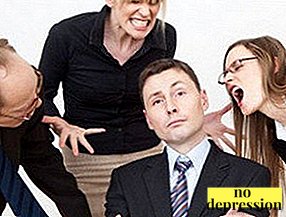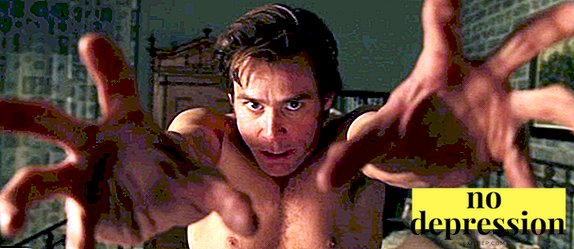The diagnosis of "depression" in most people is associated with its classical manifestations - depression, dark mood, lack of positive emotions.
However, is everything so clear? Hidden depression, symptoms and signs of which do not fit the generally accepted pattern of diagnostic boundaries, are often misleading as to their true nature. What are its features and methods of treatment?
What it is?
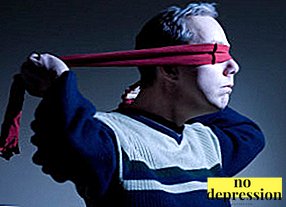
Depression, which in its severity does not reach the diagnosis of "major depression"called latent depression.
At the same time, some of the symptoms may be absent altogether or appear in a very insignificant form, and there may also be no pronounced impairment of social functioning.
What else is called?
Minor, masked, subclinical depression, subdepressive disorder - all of this various names of hidden depression.
The words “small” and “masked”, the prefix “sub” say that its symptoms are not as obvious as in a major depression, masked, hidden, but close to this diagnosis.
Depression can often go unnoticed and unrecognized. 11 habits of people with hidden depression:
Causes
The cause of hidden depression is often a whole range of changes - physiological, psycho-emotional, hormonal, which together lead to the occurrence of the disorder. But it can also be provoked by one-time heavy, stressful situations:
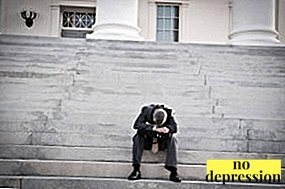 Loss of a loved one.
Loss of a loved one.- Loss of employment with further financial uncertainty.
- Forced relocation due to negative factors.
- Conflict situations in the workplace - for example, leadership pressure, combined with the constant heavy emotional atmosphere at home.
The decisive factor here is either the inability of a person to change the situation, or else such an attitude towards her. This determines risk groups People who may be subject to latent depression:
- professions associated with a large emotional load;
- genetic predisposition;
- low stress tolerance;
- low self-esteem;
- lack of volitional qualities of a person;
- lack of own housing and / or difficult social conditions.
If these factors are present separately or in a complex, one can say that a person has a risk of subdepressive disorder.
Classification and varieties
There are two types of hidden depression:
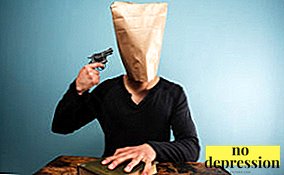 neurotic - a neurotic disorder that has the form of prolonged neurosis;
neurotic - a neurotic disorder that has the form of prolonged neurosis;- reactive - situationally caused depression.
However, these differences are so vague that they more often say that both of these manifestations occur within the same depressive state.
Symptoms and signs
In the clinical signs of latent depression somatic manifestations prevail. This is its main difference from the signs of severe depression - with a relatively normal emotional background, there is a functional disorder of the vegetative system, internal organs.
At the same time, externally signs of latent depression may not be observed externally at all - a person can remain calm and be cheerful, friendly, perform his professional duties well, and maintain his social activity.
The symptoms of latent depression are as follows:
- Labile emotional state. Remaining generally calm, a person undergoes emotional breakdowns - crying for no reason, causeless aggression, breakdowns in relatives or relatives. As a rule, such states quickly pass, a person calms down and refers to problems in the professional sphere or fatigue.
 Appetite disturbance. In this case, a person may either refuse to eat food (anorexia), or overeat, and take too much food. Change of taste preferences and volume of food intake for no apparent reason should be alerted to a loved one.
Appetite disturbance. In this case, a person may either refuse to eat food (anorexia), or overeat, and take too much food. Change of taste preferences and volume of food intake for no apparent reason should be alerted to a loved one.- Sleep disturbance. Too long sleep, after which a person still feels “broken” and tired, as well as insomnia, restless sleep with frequent awakenings can also speak of minor depression.
- Self-medication. Often, a person prescribes treatment for himself and takes antidepressants bought at a pharmacy in the hope that pharmaceuticals can help without the need for a lifestyle change.
- Obsessive Syndrome. With this syndrome, a person can make completely useless rhythmic movements - for example, jerk with a foot, knock fingers on the table, and also make useless counting of things or people for some distinctive signs - red cars, people in scarves, etc., that on its own it does not pursue any additional goals - this may also indicate latent depression.
- Psychogenic pain. With latent depression, a person may experience unreasonable pain, localized in different parts of the body. It can also be just a discomfort or a burning sensation - and when you go to a doctor, the reason usually remains unexplained.
Diagnostics

The problem of diagnosing latent depression is that the reason for going to a doctor is often somatic painwhile their psychological cause - implicit in most cases - remains in the background.
The doctor prescribes tests, but the resulting picture does not explain the cause of the pain. The patient, as a rule, is silent about their psychological disorders.
To diagnose latent depression helpful to answer the following questions:
- Have you stopped feeling satisfied with your life?
- Do you feel any narrowing of your interests lately?
- Is it hard for you to make decisions?
- Do negative thoughts often come to you?
- Do you see the lack of meaning in your life?
- Is your sleep disturbed?
- Are there any negative changes in your intimate life?
- Do you feel heaviness in the chest?
- Are you less energetic than before?
- Are appetite disorders lately?
Most affirmative answers to these questions indicate that you are very likely to have a subdepressive disorder.
Masked depression - what is it? Find out from this video:
How to treat?
Treatment of minor depression is best suited. comprehensivelyusing pharmaceuticals, specialist help and family therapy.
Drug treatment
 Antidepressants - Fluoxetine, Tsitalopram, Luvox and others will help relieve a feeling of depression from the psychological situation that provoked a minor depression, and ease the symptoms of depression.
Antidepressants - Fluoxetine, Tsitalopram, Luvox and others will help relieve a feeling of depression from the psychological situation that provoked a minor depression, and ease the symptoms of depression.- Tranquilizers - Phenazepam, Atarax, Relanium - have a calming effect. They will relieve anxiety or panic, help to keep calm. Many of them have contraindications - pregnancy, age up to 18 years, renal failure, and others.
- Nootropics - Phenibut, Vinpocetine, Piracetam - improves blood supply to the brain, which has a beneficial effect on memory, increases efficiency and resistance to high psychological and physical stress.
Psychologist help
An important addition to the treatment of hidden depression with pharmaceuticals is the help of a qualified specialist.
Exists a lot of techniques and methods for successful treatment - behavioral therapy, gestalt therapy, psychoanalysis, cognitive psychotherapy - together with the drug component can significantly improve the physiological and mental state of the patient, facilitate the course of minor depression.
Other methods

BOS-therapy (biofeedback) - a person can measure and see his own physiological parameters, for example, pressure, pulse rate, brain rhythms.
At the same time, a person not only independently monitors his physiological state, but can to some extent control him, and successful self control It has a good effect on the treatment of depression.
What can you do yourself?
The most important thing - ensure a good rest. But this does not mean that he should be completely passive - moderately active physical actions or psychological exercises - especially what brings you pleasure, will be a good background for treating depression.
Avoid and by no means do not provoke stressful situations. Keep track of your diet - so that it has the maximum amount of vitamins and minerals required for your body.
Ask friends and relatives for help - in organizing moral calm and a relaxed atmosphere.
Prognosis and prevention
The duration of the treatment of latent depression depends largely on its neglect - the treatment of the initial form will take place on average for several months, the same may be delayed for several years.
The most important thing is to diagnose depression in a timely manner - then its treatment will be greatly simplified.

For the prevention of subdepressive disorders Be sure to keep track of your daily routine, pay due attention to your rest and avoid stress.
At the first signs of minor depression, do not panic - it is best to visit a qualified specialist and ask him for advice.
Hidden Depression - Psychologist Advice:

 Loss of a loved one.
Loss of a loved one. neurotic - a neurotic disorder that has the form of prolonged neurosis;
neurotic - a neurotic disorder that has the form of prolonged neurosis; Appetite disturbance. In this case, a person may either refuse to eat food (anorexia), or overeat, and take too much food. Change of taste preferences and volume of food intake for no apparent reason should be alerted to a loved one.
Appetite disturbance. In this case, a person may either refuse to eat food (anorexia), or overeat, and take too much food. Change of taste preferences and volume of food intake for no apparent reason should be alerted to a loved one. Antidepressants - Fluoxetine, Tsitalopram, Luvox and others will help relieve a feeling of depression from the psychological situation that provoked a minor depression, and ease the symptoms of depression.
Antidepressants - Fluoxetine, Tsitalopram, Luvox and others will help relieve a feeling of depression from the psychological situation that provoked a minor depression, and ease the symptoms of depression.